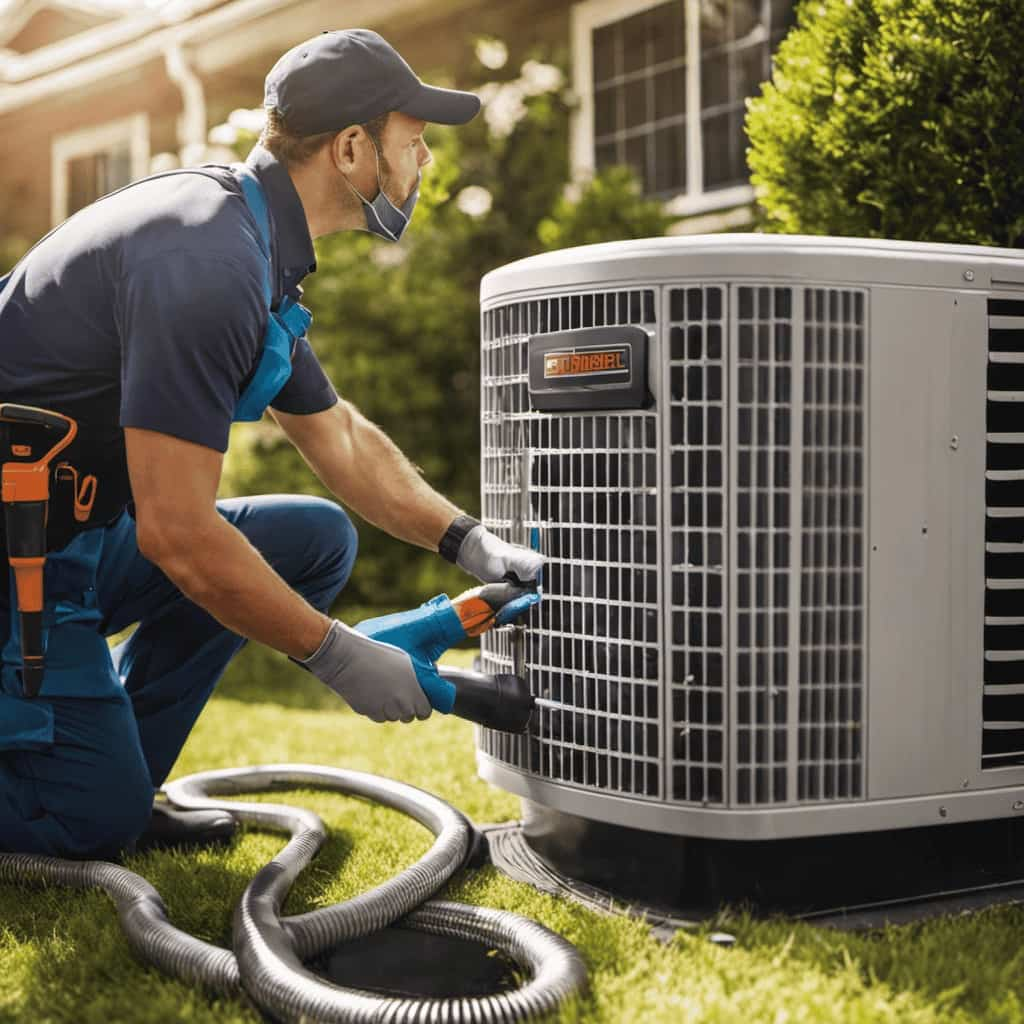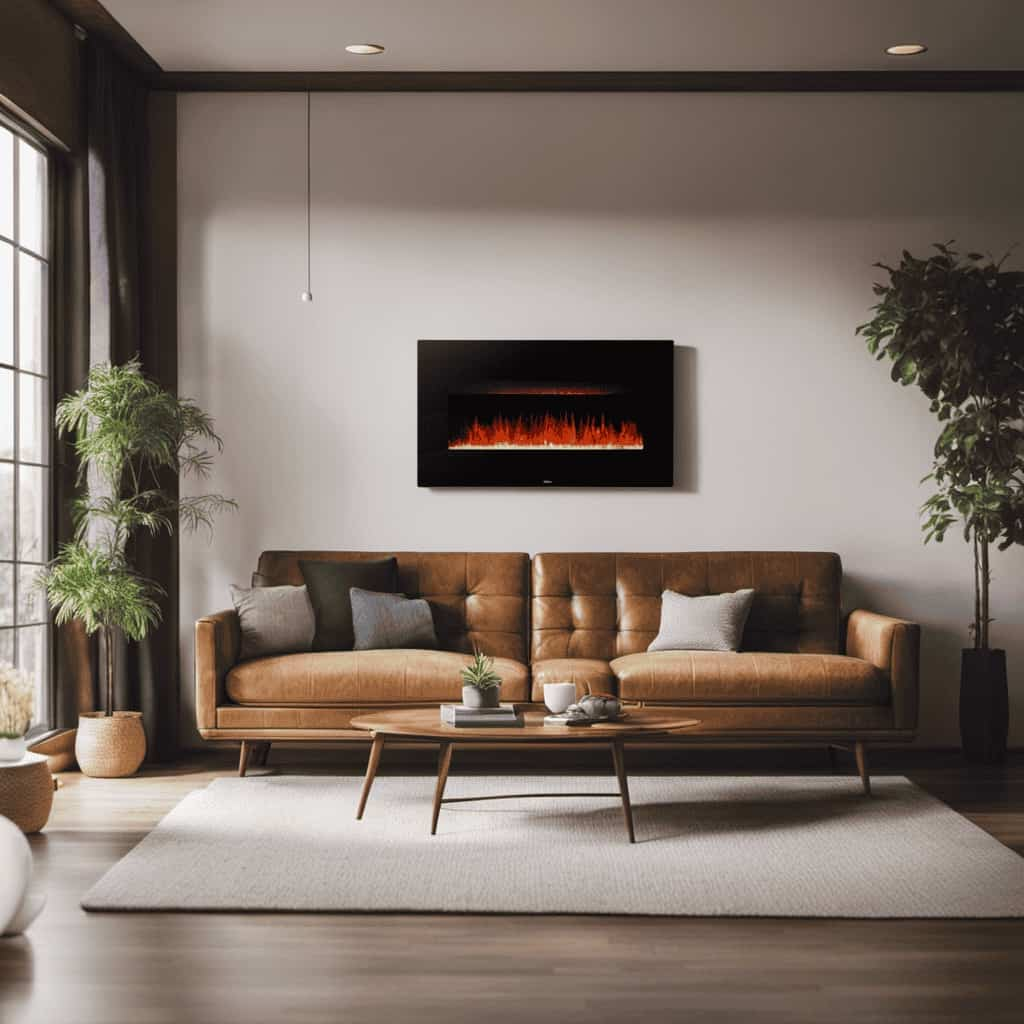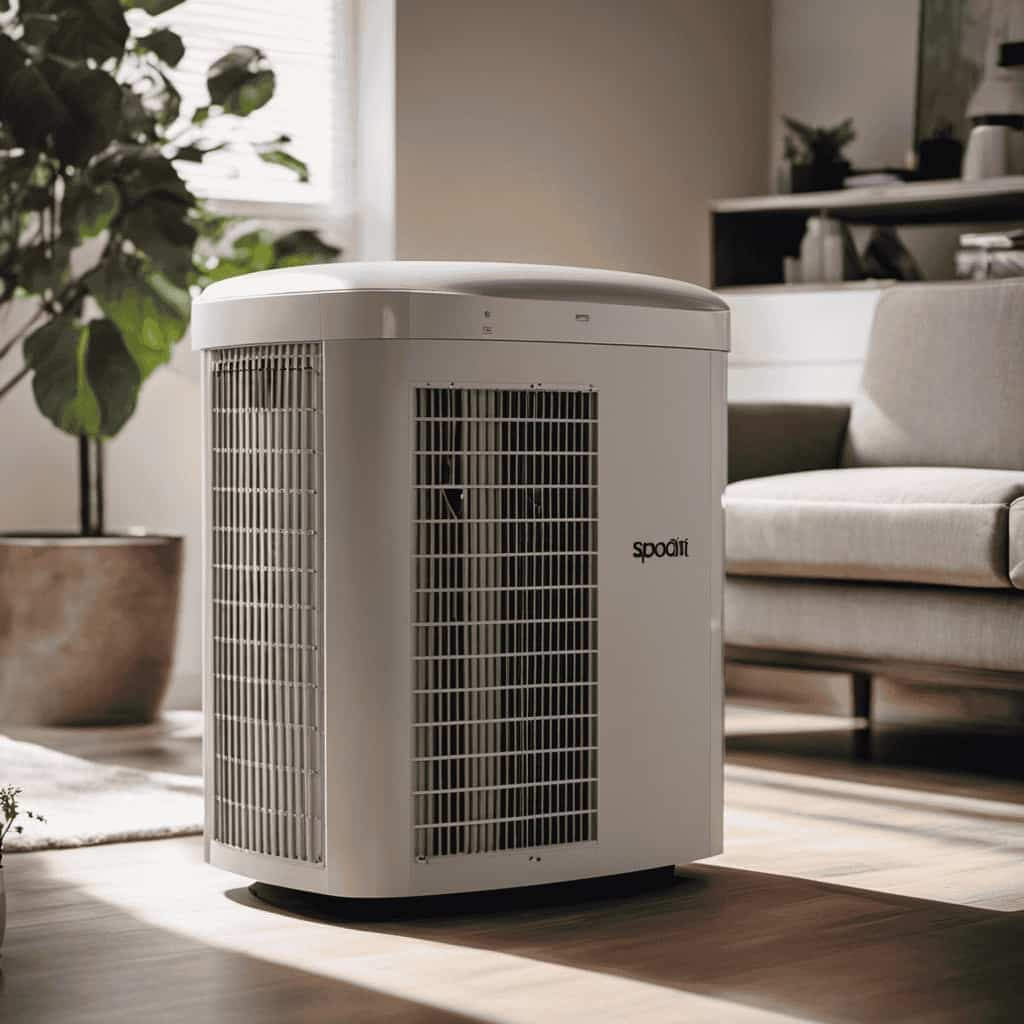Did you know that upgrading your home heating system to a high-efficiency heat pump could potentially reduce your energy costs by up to 50%? Let us help you navigate through the transition.
In this article, we’ll explain the benefits of upgrading, how a heat pump works for home heating, and how to choose the right size heat pump for your home.
We’ll also guide you through the installation process and provide tips for maintaining and troubleshooting your heat pump.
Get ready to revolutionize your home heating!
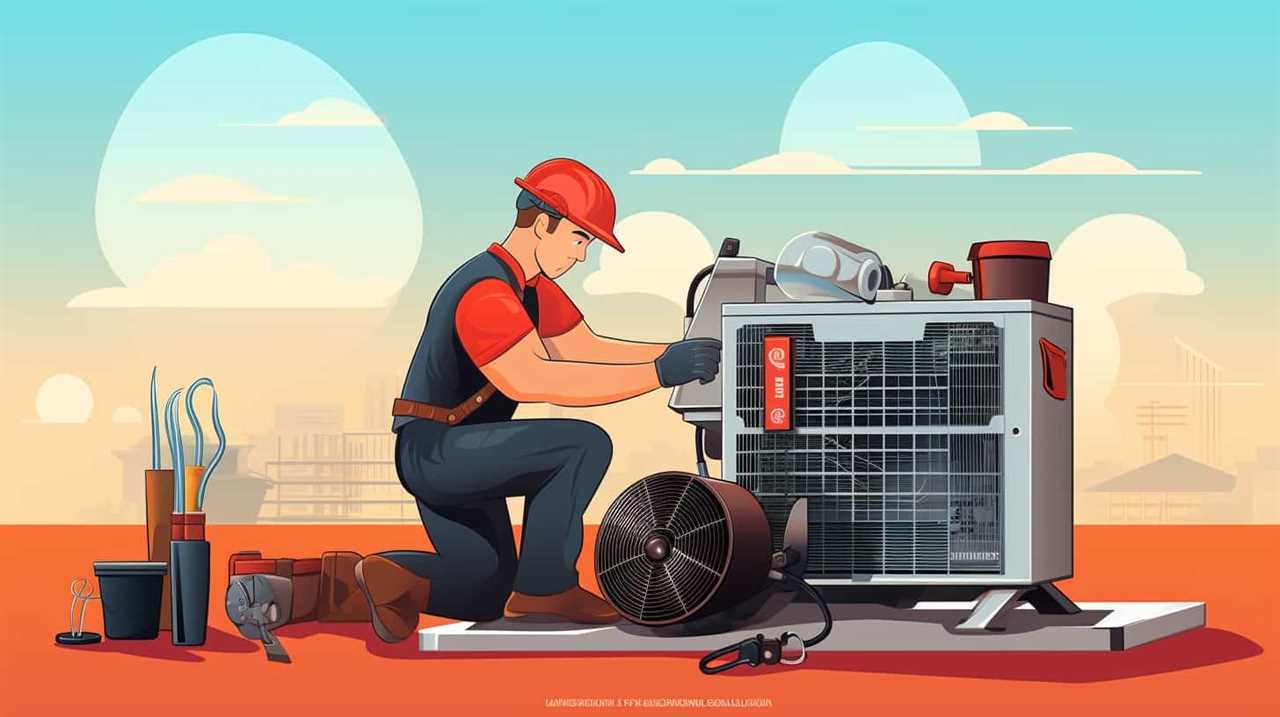
Key Takeaways
- Upgrading to a heat pump can save up to 50% on energy bills.
- Heat pumps provide both heating and cooling functions, making them versatile.
- Heat pumps reduce carbon emissions and promote sustainability.
- Choosing the right size heat pump is crucial for adequate heating and efficient operation.
The Benefits of Upgrading to a Heat Pump
We’ve found that upgrading to a heat pump offers numerous benefits for homeowners. One significant advantage is the energy savings that can be achieved. Heat pumps are designed to efficiently transfer heat from one area to another, rather than generating heat through combustion like traditional furnaces. This results in lower energy consumption and reduced utility bills.
Additionally, heat pumps have a positive environmental impact. By utilizing renewable energy sources, such as the heat in the air or ground, they produce fewer greenhouse gas emissions compared to fossil fuel-based heating systems. This not only helps to reduce carbon footprint but also contributes to improving air quality.
How a Heat Pump Works for Home Heating
First, let’s look at how a heat pump works for home heating.
- Heat pumps use a refrigeration cycle to transfer heat from one place to another, providing efficient heating for your home.
- They extract heat from the outside air or ground and transfer it indoors, even in cold weather.
- The heat pump technology allows for both heating and cooling functions, making it a versatile and cost-effective solution.
- By utilizing renewable energy sources, such as air or ground heat, heat pumps reduce carbon emissions and promote sustainability.
Heat pumps offer several benefits for home heating:

- They provide consistent and comfortable heating throughout your home.
- They’re energy-efficient, saving you money on your heating bills.
- Heat pumps are environmentally friendly, reducing your carbon footprint.
- They can also act as an air conditioner during the summer months, providing year-round comfort.
With their innovative technology and numerous advantages, heat pumps are revolutionizing home heating systems.
Energy Efficiency: Saving Money With a Heat Pump
Using a heat pump for home heating can significantly increase energy efficiency and save money on utility bills. Heat pumps are designed to transfer heat from one location to another, rather than generating heat themselves. This means that they consume less energy compared to traditional heating systems, resulting in substantial energy savings.
By utilizing the heat from the air or ground outside, heat pumps can provide efficient heating for your home throughout the year. The energy savings achieved with a heat pump can greatly reduce your environmental impact by reducing greenhouse gas emissions.
Additionally, heat pumps can also be used for cooling your home during the summer months, further maximizing their energy efficiency. With their innovative technology and ability to save energy, heat pumps are a smart choice for homeowners looking to reduce their carbon footprint and save on energy costs.

Choosing the Right Size Heat Pump for Your Home
When it comes to choosing the right size heat pump for your home, it’s important to consider your home’s specific heating needs. A heat pump that’s too small may not be able to adequately heat your home, while a heat pump that’s too large may result in inefficient operation and higher energy costs.
To determine the optimal heat pump size for your home, factors such as square footage, insulation levels, and climate conditions should be taken into account.
Optimal Heat Pump Size
Choosing the right size heat pump for our home involves evaluating our heating needs and considering factors such as square footage, insulation, and climate. To ensure optimal performance and energy efficiency, here are some sizing considerations to keep in mind:
- Square footage: Determine the total area of our home to calculate the heat pump capacity needed.
- Insulation: Assess the level of insulation in our home, as well-insulated spaces require less heating power.
- Climate: Consider the climate in our region, as colder climates may require a larger heat pump capacity.
- Heat loss/gain: Take into account the amount of heat gained or lost through windows, doors, and other sources.
Calculating the capacity of our heat pump is crucial for achieving efficient and effective heating.

Now, let’s move on to the next section where we discuss our home-specific heating needs.
Home-Specific Heating Needs
To accurately determine the right size heat pump for our home, we must consider our specific heating needs and take into account factors such as square footage, insulation, and climate. Properly assessing our home’s heating requirements is crucial in ensuring optimal performance and energy efficiency from a heat pump system. One important factor to consider is home insulation. Well-insulated homes require smaller heat pumps as they retain heat more effectively. On the other hand, homes with poor insulation will require larger heat pumps to compensate for heat loss. Another consideration is alternative heating methods, such as fireplaces or radiant floor heating. These systems may reduce the heating load on the heat pump, allowing for a smaller unit. By carefully evaluating these factors, we can choose the right size heat pump that meets our specific heating needs and maximizes energy savings.
To accurately determine the right size heat pump for our home, we must consider our specific heating needs and take into account factors such as square footage, insulation, and climate. Properly assessing our home’s heating requirements is crucial in ensuring optimal performance and energy efficiency from a heat pump system. One important factor to consider is home insulation. Well-insulated homes require smaller heat pumps as they retain heat more effectively. On the other hand, homes with poor insulation will require larger heat pumps to compensate for heat loss. Another consideration is alternative heating methods, such as fireplaces or radiant floor heating. These systems may reduce the heating load on the heat pump, allowing for a smaller unit. By carefully evaluating these factors, we can choose the right size heat pump that meets our specific heating needs and maximizes energy savings.
| Heating Needs | Considerations |
|---|---|
| Square Footage | Larger homes require larger heat pumps |
| Insulation | Well-insulated homes require smaller heat pumps |
| Climate | Colder climates may require larger heat pumps |
Now that we have determined our home’s specific heating needs, we can move on to the next step: the installation process of a modern heat pump.

Installation Process of a Modern Heat Pump
We can simplify the installation process of a modern heat pump by following a step-by-step guide. Here are four important steps to consider:
-
Site Evaluation: A professional technician will assess your home’s heating needs and determine the best location for your heat pump.
-
Ductwork Modifications: In some cases, existing ductwork may need modifications or additions to ensure proper airflow and distribution.
-
Electrical Connections: The heat pump requires a dedicated electrical circuit, so an electrician will install the necessary wiring and connect it to your main electrical panel.

-
Refrigerant Charging: Once the unit is installed, a qualified technician will charge the heat pump with the appropriate amount of refrigerant to ensure optimal performance.
By following these steps, you can ensure a smooth and efficient installation process for your modern heat pump.
Enjoy the numerous benefits of home heating provided by this innovative technology.
Maintaining and Troubleshooting Your Heat Pump
Now that we’ve discussed the installation process of a modern heat pump, let’s turn our attention to maintaining and troubleshooting this essential home heating system.

It’s important to be aware of common heat pump issues that may arise and have the knowledge to troubleshoot them on our own. Regular maintenance is also crucial to keep our heat pump running efficiently and avoid costly repairs.
In this section, we’ll explore common heat pump problems, provide DIY troubleshooting tips, and emphasize the importance of regular maintenance.
Common Heat Pump Issues
Let’s address common heat pump issues and how to maintain and troubleshoot them effectively. Here are some key points to consider:
-
Regular heat pump maintenance: To ensure optimal performance, it’s important to schedule regular maintenance for your heat pump. This includes cleaning or replacing filters, checking refrigerant levels, and inspecting electrical connections.

-
Troubleshooting heat pump noise: If your heat pump is making unusual noises, it could indicate a problem. Check for loose components, debris in the outdoor unit, or worn-out fan motors. Addressing these issues promptly can prevent further damage and improve the overall efficiency of your system.
-
Thermostat calibration: A poorly calibrated thermostat can lead to temperature inconsistencies and increased energy consumption. Ensure your thermostat is properly calibrated to accurately control the heating and cooling cycles of your heat pump.
-
Ductwork inspection: Leaky or poorly insulated ductwork can result in reduced airflow and energy loss. Regularly inspect and seal any leaks in your ductwork to optimize the performance of your heat pump.
DIY Troubleshooting Tips
To effectively maintain and troubleshoot your heat pump, it’s essential to follow these DIY troubleshooting tips.

When diagnosing problems, start by checking the thermostat settings and ensuring they’re accurate.
Next, inspect the air filters and clean or replace them if necessary, as clogged filters can restrict airflow and cause malfunctions.
It’s also important to check the outdoor unit for any obstructions such as leaves or debris, as these can impede the heat pump’s performance.
Additionally, inspect the indoor and outdoor coils for dirt or frost buildup, as this can affect the heat transfer process.
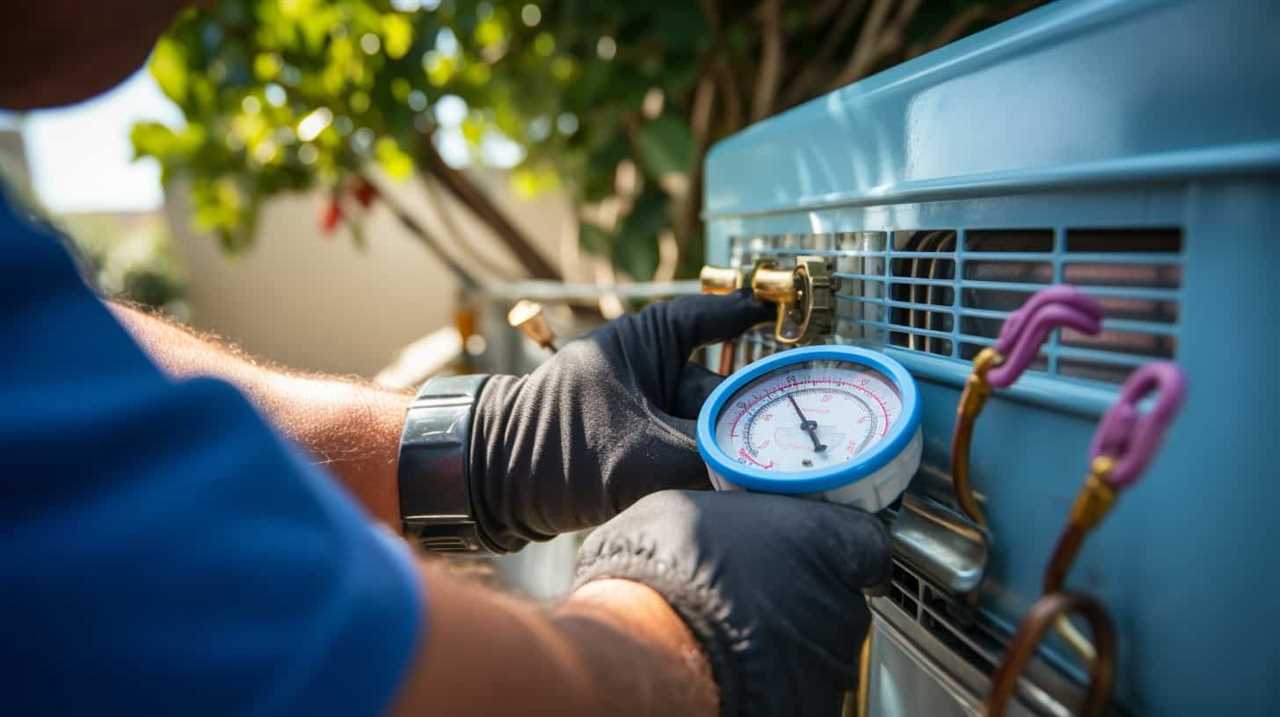
If you notice any strange noises or unusual smells coming from your heat pump, it may indicate a problem that requires professional attention.
Importance of Regular Maintenance
We should regularly maintain and troubleshoot our heat pump to ensure its optimal performance and energy efficiency. Regular maintenance is crucial for the smooth functioning of a heat pump and to prevent any potential issues that may arise.
Here are a few reasons why regular maintenance is important:
- Extends the lifespan of the heat pump
- Improves energy efficiency, reducing utility bills
- Enhances indoor air quality by keeping filters clean
- Identifies and addresses minor issues before they become major problems
To troubleshoot heat pump issues, it’s essential to check for common problems such as inadequate heating or cooling, strange noises, or system malfunctions. Regularly cleaning or replacing air filters, inspecting outdoor units for debris, and ensuring proper airflow are also vital troubleshooting steps.
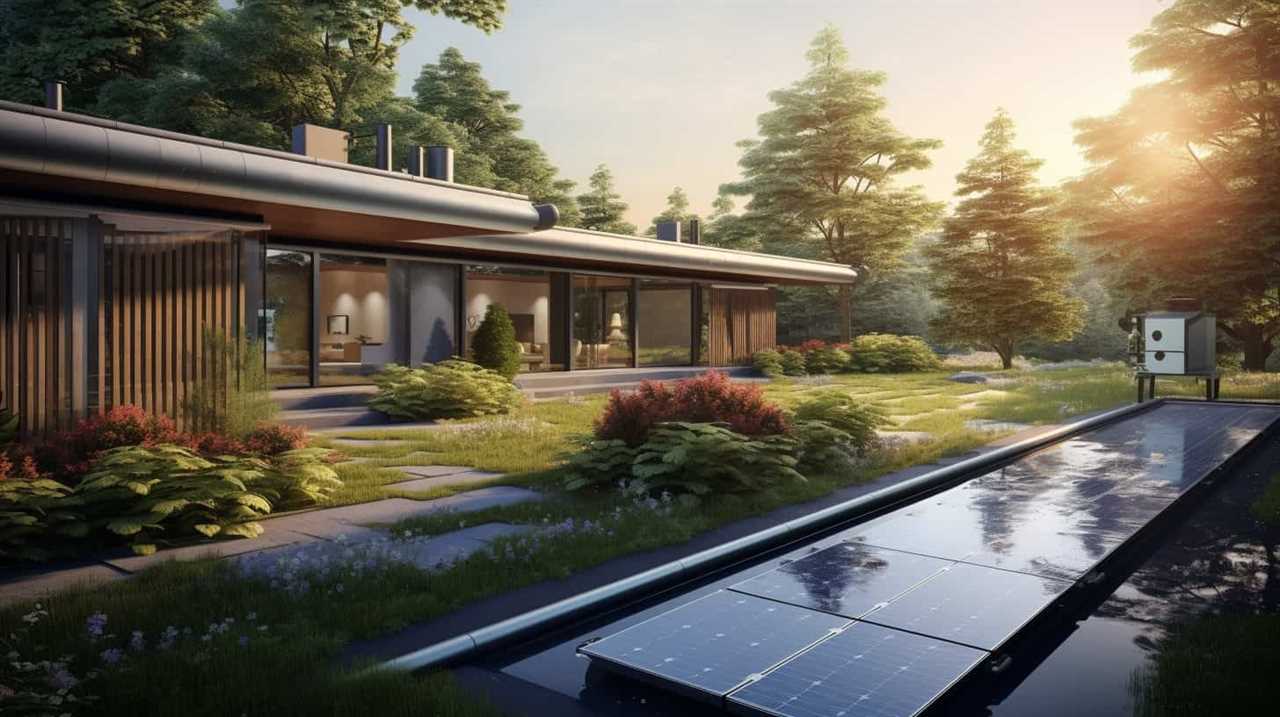
Comparing Heat Pump Options: Which One Is Right for You?
When comparing heat pump options, determining the right one for you depends on factors such as budget, energy efficiency, and heating needs. There are several heat pump brands available in the market, each offering different features and capabilities.
It’s essential to conduct a cost comparison to find the best option for your specific requirements. Consider the initial purchase cost, installation expenses, and long-term energy savings. Additionally, evaluate the energy efficiency ratings of different models. Look for units with high Seasonal Energy Efficiency Ratio (SEER) and Heating Seasonal Performance Factor (HSPF) ratings, as they indicate better energy efficiency.
Furthermore, assess your heating needs based on the climate in your area. If you live in a colder region, you may require a heat pump with a higher heating capacity.
Frequently Asked Questions
Can a Heat Pump Be Used for Both Heating and Cooling?
Yes, a heat pump can be used for both heating and cooling. This dual functionality is one of the many benefits of heat pumps. They offer high efficiency and can effectively regulate indoor temperatures, providing comfort year-round.

How Long Does a Heat Pump Typically Last?
Heat pump maintenance is crucial for maximizing its lifespan. Signs of heat pump failure include reduced efficiency, strange noises, and inconsistent heating or cooling. Regular inspections and timely repairs can help ensure your heat pump lasts for many years.
Are There Any Tax Credits or Incentives Available for Installing a Heat Pump?
There are tax credits and incentives available for installing a heat pump. Energy efficiency programs often provide financial assistance to encourage the use of modern heating systems. These incentives can help offset the cost of upgrading your home heating.
What Is the Average Cost of Installing a Heat Pump?
The average cost of installing a heat pump varies depending on factors such as the type of heat pump and average installation time. It’s important to consider these factors when planning for an upgrade in home heating.
Can a Heat Pump Be Used in Extremely Cold Climates?
A heat pump can be used in extremely cold climates with high heat pump efficiency. The benefits of using a heat pump in cold climates include energy savings, reduced carbon emissions, and consistent indoor comfort.
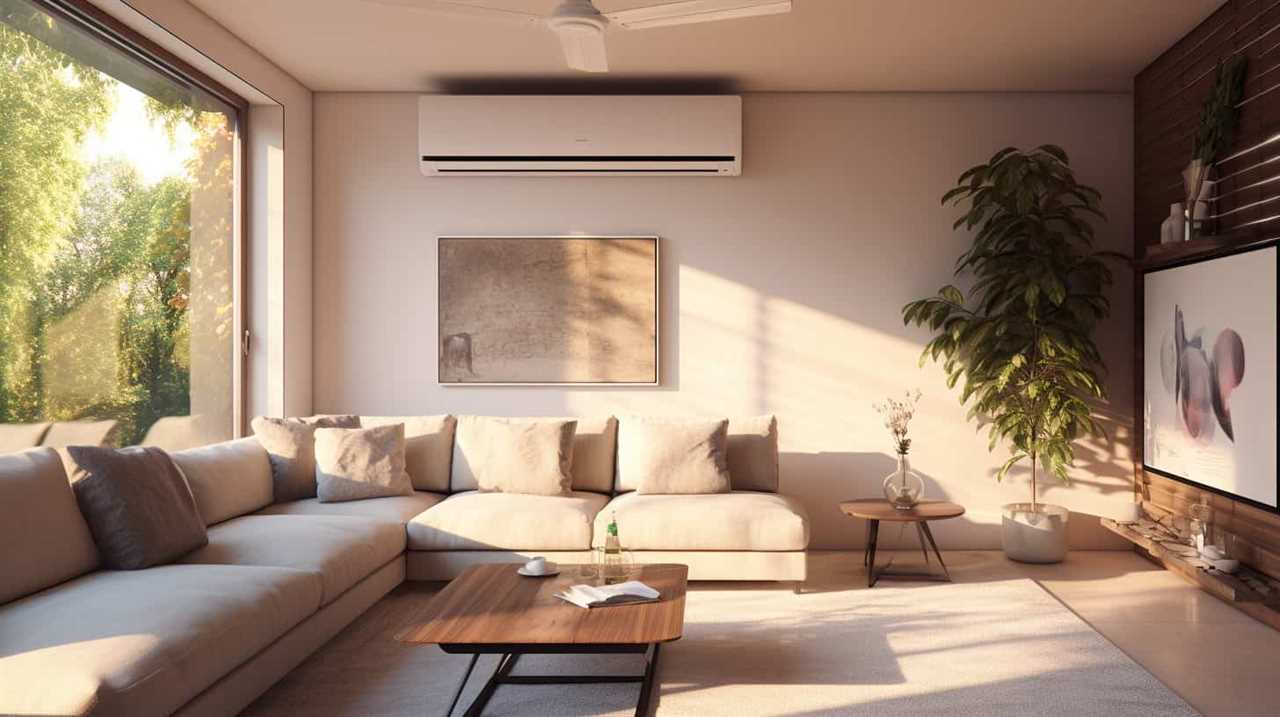
Conclusion
In conclusion, upgrading to a modern heat pump offers numerous benefits for homeowners.
Not only does it provide efficient home heating, but it also helps save money by maximizing energy efficiency.
By choosing the right size heat pump for your home and properly maintaining it, you can enjoy the comfort and cost savings it brings.
So why stick with outdated heating systems when you can ‘turn up the heat’ with a modern and efficient heat pump?
